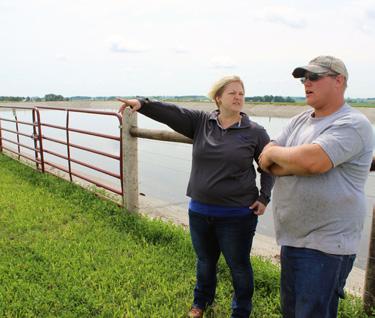
5 minute read
Danger on the Mississippi River
Danger on the Mississippi
A report from the Wisconsin Initiative on Climate Change Impacts shows how Wisconsin communities and habitats along the Mississippi River are at risk.
By Dea Larsen Converse, Wisconsin Initiative on Climate Change Impacts
From tourism to agriculture to biodiversity, the stretch of the Mississippi River that borders western Wisconsin is a critical resource — and one that is put at an increasing risk due to climate change. A focus on climate impacts from the Wisconsin Initiative on Climate Change Impacts (WICCI) shows the Mississippi River communities and habitats in Wisconsin are at risk due to the increasing variability in river flows caused by changes in precipitation, snow melt, storm intensity, and land use. The last two decades have been the warmest on record in Wisconsin and the past decade has been the wettest. Extended high water and fall flooding have occurred on the Mississippi River in seven of the last 10 years.
The Mississippi River provides Wisconsin with an array of services and natural capital. The 33 historic river towns and villages along the Wisconsin Great River Road, 250 miles along the Mississippi River, is a major tourism attraction. The agriculture sector relies on the river for deliveries of agricultural chemicals and shipments of commodities. The excessive volume of water impacts tourism, causes damage to transportation infrastructure, and delays deliveries of agricultural chemicals and shipments of commodities. High-water years also deliver sediment and nutrients that lead to harmful algal blooms and contribute to the expansion of the Gulf of Mexico hypoxic zone.
Hundreds of thousands of migrating waterfowl rely on the aquatic plant populations in the river as a critical food source. Waters in the river floodplain away from the main channel, known as backwater lakes, are central to the biological pro-
Flooding has caused damage to transportation infrastructure on the Mississippi River. Mississippi River lock and dam under water during 2019 flood in the Rock Island District, Iowa. Photo credit: United States Army Corps of Engineers
– Shawn Giblin, WICCI Mississippi River sub-group co-chair

High and variable flow conditions are causing significant damage to the Mississippi River ecosystem. Floodplain trees as the water levels decline after the 2019 flood. La Crosse, Wis. Photo credit: Kathi Jo Jankowski
ductivity and diversity in the system. They provide refuge from the high flows in the Mississippi, habitat for fish to spawn and overwinter, and essential habitat for waterfowl and other wildlife. High and variable flow conditions associated with climate change are causing significant damage to these and other Mississippi River habitats, such as floodplain forests.
The WICCI Mississippi River Group recommends actions to make the Mississippi River basin more climate resilient, including restoring natural areas, investing in flood risk reduction practices and pre-disaster mitigation programs, and developing a two-dimensional hydraulic model to help with Mississippi River habitat projects, community flood risk evaluation, and management. There is hope for the future — but it’s up to us.
Support WICCI
The Wisconsin Initiative on Climate Change Impacts (WICCI) is a statewide collaboration of scientists and stakeholders formed as a partnership between UW–Madison’s Nelson Institute for Environmental Studies and the Wisconsin Department of Natural Resources. WICCI’s goals are to evaluate climate change impacts on Wisconsin and foster solutions. Gifts to the WICCI Program Fund provide general, discretionary program support and enhance and expand WICCI’s teaching, research, and public service roles. Gifts are also used to support partnership-building activities, including faculty, staff, and student recruitment, retention, and morale. This article is part of a series highlighting the contribution from each WICCI Working Group for the 2021 WICCI Assessment Report. Next month, we’ll showcase work from the Plants and Natural Communities working group.
Mississippi River Group
Impacts of climate change on the Mississippi River
Improving habitat in a Mississippi River channel
Ecological impacts of sedimentation in the Blackdeer Channel
Around the globe, graduates of the Nelson Institute for Environmental Studies are living out the Wisconsin Idea as they teach, research, and champion the fields of conservation, sustainability, and environmental justice. Each year, the Nelson Institute honors several standout alumni whose work embodies the institute’s vision of creating sustainable communities and enhancing the quality of life and the environment in Wisconsin and the world.
Alumni awards are presented in two categories: the Rising Star Alumni Award and the Distinguished Alumni Award. The Rising Star Alumni Award recognizes our most recent alumni — those under 35 years of age or who graduated within the past 10 years — who are making a significant difference in their communities through research, volunteering, or business. The Distinguished Alumni Award recognizes graduates with a notable degree of long-term success or impact in their field or communities. Honorees are recognized at the annual Rendezvous on the Terrace event, held this year on September 23.
Rising Star Alumni Award
Keefe Keeley MS’14, PhD’21 Co-Director, The Savanna Institute
Breana Nehls ’16 Program Manager, American Society of Adaptation Professionals
Patricia O’Kane PhD’15
Senior Lecturer, University of Vermont Rubenstein School of Environment and Natural Resources
Distinguished Alumni Award
Margaret Krome MS’89 Agricultural Policy Coordinator, Michael Fields Agricultural Institute
Robert Ribe MS’81, MA’87, PhD’90 Professor and Director of MLA Program, University of Oregon Department of Landscape Architecture
Ashok Sarkar PhD’97 Senior Energy Specialist, World Bank
Read on to learn about each award winner, their impacts on campus, and their hopes for the future.
You’re Invited!
Join us on Friday, September 23, for Rendezvous on the Terrace. Connect with Nelson Institute faculty, current students, and your fellow alumni as we celebrate this year’s alumni award winners. The event is free to attend, but registration is required. Sign up today to reserve your spot!

2022 Rendezvous on the Terrace
Friday, September 23, 2022 Alumni Lounge, Pyle Center, Madison











